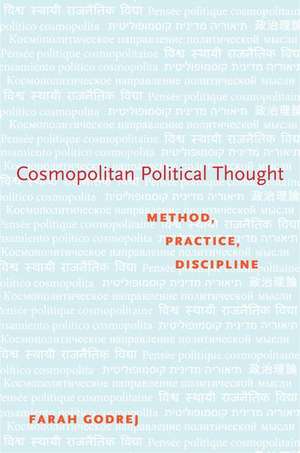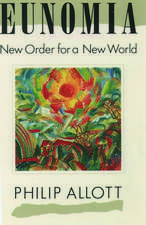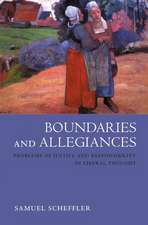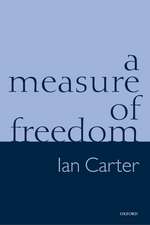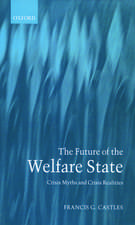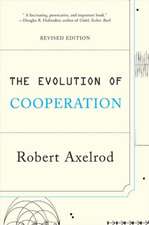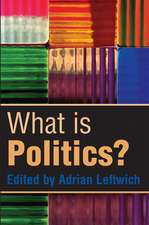Cosmopolitan Political Thought: Method, Practice, Discipline
Autor Farah Godrejen Limba Engleză Hardback – 13 oct 2011
| Toate formatele și edițiile | Preț | Express |
|---|---|---|
| Paperback (1) | 240.60 lei 31-37 zile | |
| Oxford University Press – 13 oct 2011 | 240.60 lei 31-37 zile | |
| Hardback (1) | 561.48 lei 31-37 zile | |
| Oxford University Press – 13 oct 2011 | 561.48 lei 31-37 zile |
Preț: 561.48 lei
Preț vechi: 806.61 lei
-30% Nou
Puncte Express: 842
Preț estimativ în valută:
107.47€ • 116.78$ • 90.34£
107.47€ • 116.78$ • 90.34£
Carte tipărită la comandă
Livrare economică 10-16 aprilie
Preluare comenzi: 021 569.72.76
Specificații
ISBN-13: 9780199782062
ISBN-10: 0199782067
Pagini: 224
Dimensiuni: 234 x 163 x 20 mm
Greutate: 0.42 kg
Ediția:New.
Editura: Oxford University Press
Colecția OUP USA
Locul publicării:New York, United States
ISBN-10: 0199782067
Pagini: 224
Dimensiuni: 234 x 163 x 20 mm
Greutate: 0.42 kg
Ediția:New.
Editura: Oxford University Press
Colecția OUP USA
Locul publicării:New York, United States
Recenzii
For those who hope to move political theory beyond Eurocentrism, Cosmopolitan Political Thought is an excellent place to start.
Critiques of Eurocentrism have been around in academia for several decades but their impact on political theory has been painfully slow. Worse, an alternative that breaks the stranglehold of hegemonic categories and engages with multiple traditions of thought has barely germinated. Lucid, wide-ranging and well-informed, Farah Godrej's book is a significant contribution to an important and emerging field of enquiry that is destined to transform existing power relations in political theory.
It seems obvious that political theorizing in a globalized context should not be limited to the preoccupations and normative commitments of Western liberal societies. But what might a more cosmopolitan mode of political theorizing look like? Farah Godrej's fascinating new book shows that it involves a journey of radical self-dislocation and self-relocation that is both difficult and necessary.
There has been a knowledge-explosion in the fields of the political philosophies of India, China and Islam. This has been accompanied by the emergence of a new generation of scholars well versed in the very same fields. These two phenomena pose a problem to the traditional way of teaching of Western political philosophy. Farah Godrej, a leader of the new generation of scholars, makes a bold and timely proposal for the reform of the field of political philosophy. Well documented and well argued, this book is a welcome addition to the literature on how political philosophy should be studied in the twenty-first century.
Ambitious in its intellectual breadth and depth, and infused with a keen grasp of the politics of our time and what they demand from engaged intellectuals who hope to make a difference in the world, this is a first-rate contribution and a passionate plea for cosmopolitanism.Students and scholars of comparative political theory will find much food for thought in this provocative, rich, and thoughtful volume.
By traveling with philosophical ideas and reworking them through encounters with cultural difference, Godrej enriches our thinking about the relationship between political theory and alterity.
Critiques of Eurocentrism have been around in academia for several decades but their impact on political theory has been painfully slow. Worse, an alternative that breaks the stranglehold of hegemonic categories and engages with multiple traditions of thought has barely germinated. Lucid, wide-ranging and well-informed, Farah Godrej's book is a significant contribution to an important and emerging field of enquiry that is destined to transform existing power relations in political theory.
It seems obvious that political theorizing in a globalized context should not be limited to the preoccupations and normative commitments of Western liberal societies. But what might a more cosmopolitan mode of political theorizing look like? Farah Godrej's fascinating new book shows that it involves a journey of radical self-dislocation and self-relocation that is both difficult and necessary.
There has been a knowledge-explosion in the fields of the political philosophies of India, China and Islam. This has been accompanied by the emergence of a new generation of scholars well versed in the very same fields. These two phenomena pose a problem to the traditional way of teaching of Western political philosophy. Farah Godrej, a leader of the new generation of scholars, makes a bold and timely proposal for the reform of the field of political philosophy. Well documented and well argued, this book is a welcome addition to the literature on how political philosophy should be studied in the twenty-first century.
Ambitious in its intellectual breadth and depth, and infused with a keen grasp of the politics of our time and what they demand from engaged intellectuals who hope to make a difference in the world, this is a first-rate contribution and a passionate plea for cosmopolitanism.Students and scholars of comparative political theory will find much food for thought in this provocative, rich, and thoughtful volume.
By traveling with philosophical ideas and reworking them through encounters with cultural difference, Godrej enriches our thinking about the relationship between political theory and alterity.
Notă biografică
Farah Godrej is Assistant Professor of Political Science at the University of California-Riverside
